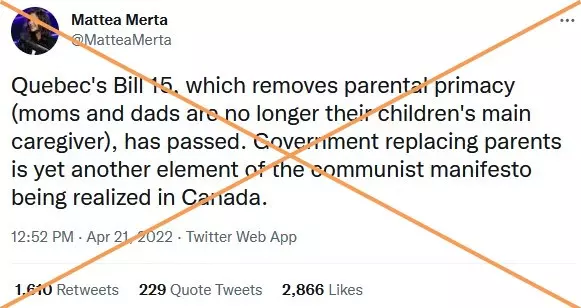Social media posts claim a recently passed reform of the law governing child welfare in the Canadian province of Quebec eliminated parental primacy, increasing government power to make decisions regarding children. This is misleading; the government says the measure sought to clarify that the child's best interest should be considered above all else, and experts say the language defining when child protective services should take action remains unchanged.
"Quebec's Bill 15, which removes parental primacy (moms and dads are no longer their children's main caregiver), has passed. Government replacing parents is yet another element of the communist manifesto being realized in Canada," says an April 21, 2022 tweet shared and liked thousands of times.

Screenshot of a tweet taken on April 26, 2022 Other versions of the same claim appeared on Twitter and Facebook.
A push to overhaul Quebec's 1977 Youth Protection Act (YPA) followed the 2019 death of a seven-year-old girl at the hands of her mother. The child had been under the supervision of the youth protection service since birth.
Bill 15, which introduced reforms to the YPA, passed the National Assembly of Quebec unanimously on April 14, 2022.
But it is not aimed at allowing the government to broadly replace parents.
The claims about Bill 15 circulating online amount to "disinformation," Robert Maranda, a spokesperson for Quebec's Ministry of Health and Social Services, told AFP.
"Bill 15 makes the child's best interest the primary consideration," he said.
The province aims "to keep the child in the family and to provide all necessary support to the parents," he said, while noting that leaving or returning children to the family environment "should only be preferred if it is in the best interests of the child."
He also said that the changes will improve collaboration and communication between people responsible for a child's situation, including the regional Director of Youth Protection (DYP).
Changes to YPA
Alain Roy, faculty of law professor at the University of Montreal, said the principle of parental primacy is derived from provisions in the YPA that Bill 15 did not change.
Section 2.2 was not amended and continues to give parents "the primary responsibility for the care, maintenance and education of a child and for ensuring his supervision."
 Screenshot of section 2.2 of Quebec's Youth Protection Act taken on May 6, 2022
Screenshot of section 2.2 of Quebec's Youth Protection Act taken on May 6, 2022 Section 3 was changed to clarify that the interest of the child is a primary consideration in the application of the Act. Section 4 was also amended to say: "Every decision made under this Act must aim at ensuring continuity of care as well as the stability of the child's relationships and of living conditions appropriate to his needs and age."
Roy said: "The purpose of the law is not to protect the parents, but to protect the child. While it may be considered to be in the best interests of the child to remain with or return to his or her parents, this cannot and should not be made an absolute presumption."
He disagreed with the online claim that the changes will allow the state to systematically set aside family ties.
"The Youth Protection Act, both before and after Bill 15, remains a law of exception. The measures provided for in it can only be deployed when the safety or development of the child is compromised," he said.
The YPA most often applies in cases of negligence, physical and sexual abuse, as described in sections 38 and 38.1.
"The state cannot in any way interfere in the family unit under the pretext that the child would be better off elsewhere, in an economically better-off environment for example," Roy said.
Vaccination
Additional video posts claim that actions such as refusing to vaccinate a child could warrant an intervention by the government under the changes to the YPA.
But Roy said section 38 of the YPA defined dangerous situations for children, and Bill 15 did not change it.
"I am not aware of any decisions considering that the parents' refusal to have the child vaccinated or to wear the mask constituted negligence justifying the intervention of the DYP," he said.
Roy said some confusion may have resulted from the case of a father who legally requested to vaccinate his children against Covid-19 over the objections of the mother. The court sided with the father.
But the courts have not intervened to force the vaccination of a child when both parents objected, Roy added.
Mona Paré, professor in the civil law section of the faculty of law at the University of Ottawa, said that without the full implementation of Bill 15, it remains open to speculation about how it will be applied by the courts. But "nothing in the changes addresses parenting practices," she said.
She agreed with Roy that cases under the YPA will remain the exception, and also pointed out that section 38 and the definitions for how and when DYP should assess child safety have not been changed.
"The law does not allow the government to rule on whether the parenting style is in the best interest of the child or not. Only when the child is truly at risk will action be taken," she said.
Indigenous response
Bill 15 also prompted harsh criticism from representatives of local Indigenous communities.
"Bill 15 does not live up to our ambitions because it does not recognize our inherent right to self-determination in matters of youth protection," the Assembly of First Nations Quebec-Labrador said in a statement.
For decades, Canada and Christian churches ran a residential schools system in which Indigenous children were forcibly taken away from their family, neglected and abused. The discovery in 2021 of a series of unmarked graves near residential schools sent shockwaves throughout the country.
(Except for the headline, this story has not been edited by BOOM staff and is published from a syndicated feed.)